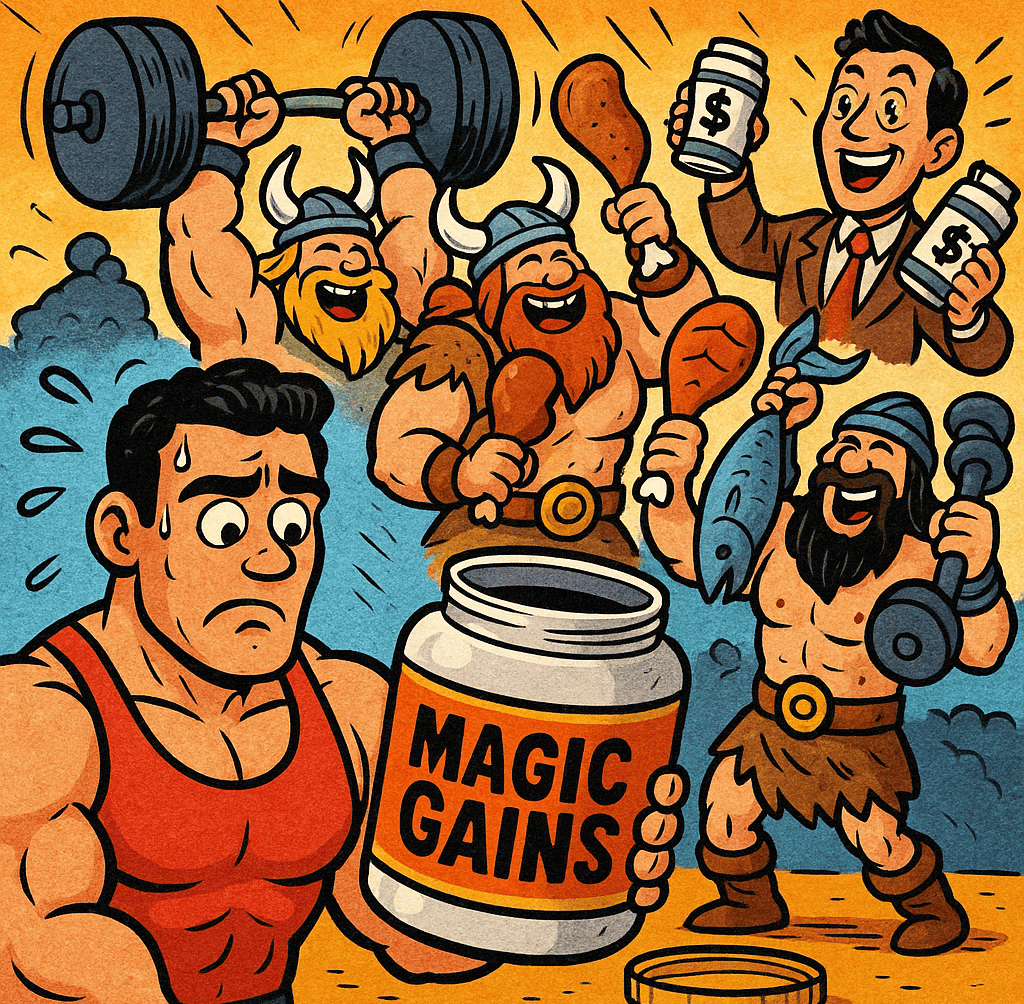Nutrition Myth #7: You Can’t Build Muscle Without Supplements
Many believe supplements are required for muscle growth. Learn why consistency, training, and protein matter most, how marketing fuels the myth, and why supplements are optional, not essential.
NUTRITION
Adi English
3 min read


🏋️ Nutrition Myth #7: “You Can’t Build Muscle Without Supplements”
📖 Article (~320 words)
Here’s a myth that sells billions every year: the idea that if you don’t take protein powder, creatine, or some secret booster with a name like “Mega Hulk 5000,” you’ll never build muscle. Bro, relax. People were jacked centuries before GNC stores popped up in malls. The Vikings weren’t slamming whey shakes on their way into battle.
Here’s the truth: supplements can help, but they are not required to build muscle. What actually matters most is consistent training, eating enough protein, sleeping well, and sticking with it long-term. If you don’t lift weights, no amount of magic powder will give you biceps.
Protein powder is just food in a convenient form. If you can get enough protein from chicken, fish, beans, or eggs, you don’t need a shake. Creatine is one of the most researched supplements and it works, but again — it’s optional, not mandatory. Most other flashy products? Usually just expensive caffeine with fancy labels.
The reason this myth sticks around is marketing. Companies want you to believe gains come in a tub, not from showing up at the gym consistently for months and years. Supplements are like bonus points—they might give you a small edge, but the game is still won with the basics.
Supplements are the tip of the pyramid, not the foundation. If you can’t grow without creatine, you won’t grow with it either—you’ll just be a better hydrated version of small. They are additional boosters, like a cherry on top of your consistency in other areas.
Takeaway: You can build plenty of muscle without supplements. They can help, but they’re never a replacement for training, nutrition, and consistency.
🗂 Vocabulary
Supplements – products like powders or pills that add nutrients to your diet.
Simple: Extra things to boost your diet.
Example: Protein powder is a common supplement.
Student example: ____________
Training – exercise or workouts to improve fitness.
Simple: Working out.
Example: Training in the gym builds strength.
Student example: ____________
Protein – a nutrient that builds and repairs muscles.
Simple: Found in meat, eggs, beans, and shakes.
Example: Protein is needed for muscle growth.
Student example: ____________
Consistency – doing something regularly without stopping.
Simple: Sticking with it.
Example: Consistency in training gives results.
Student example: ____________
Creatine – a popular supplement that helps with strength and energy.
Simple: A powder that boosts workout performance.
Example: Many athletes use creatine safely.
Student example: ____________
Optional – something you can choose but don’t have to do.
Simple: Not required.
Example: Supplements are optional for building muscle.
Student example: ____________
Marketing – promoting and selling products.
Simple: Ads and promotion.
Example: Marketing makes people think supplements are magic.
Student example: ____________
Foundation – the base or most important part of something.
Simple: The starting point.
Example: Training and food are the foundation of muscle growth.
Student example: ____________
Edge – a small advantage.
Simple: Something that helps a little.
Example: Creatine may give athletes an edge.
Student example: ____________
Takeaway – the most important lesson or point.
Simple: The main thing to remember.
Example: The takeaway is that supplements are not required.
Student example: ____________
📝 Exercises
Comprehension
What do people wrongly believe about supplements?
What really builds muscle?
What is protein powder compared to?
Why do companies push supplements so hard?
What is the main takeaway of the article?
Multiple Choice
Which is most important for muscle growth?
a) Supplements b) Consistency c) Marketing d) Expensive powders
What is creatine?
a) A protein food b) A common supplement c) A fat burner d) A vitamin
What does protein powder really represent?
a) Magic b) Convenience c) Steroids d) Marketing only
Why do companies promote supplements heavily?
a) They taste great b) For marketing c) To replace training d) To provide sleep
What does “foundation” mean here?
a) A type of supplement b) The base c) A workout move d) A protein shake
Fill in the Blank
Supplements are ______, not required.
Muscle growth needs training, nutrition, and ______.
Protein powder is basically just ______.
Creatine can give a small workout ______.
The main ______ is that supplements are not necessary.
True/False
Supplements are required for muscle growth. (False)
Protein powder is just a convenient form of protein. (True)
Marketing makes supplements seem more important than they are. (True)
Consistency is the foundation of progress. (True)
The article says you must take creatine to grow muscle. (False)
Discussion
Do you think supplements are overrated?
What supplements, if any, have you tried?
Why is consistency more important than supplements?
Can marketing mislead people in fitness?
What is your personal takeaway from this article?
